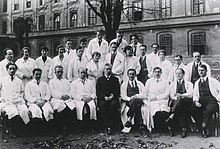Lydia Sure
Lydia Safe (born December 19, 1890 in Vienna , Austria-Hungary ; died April 2, 1962 in Los Angeles ) was an Austrian - American psychiatrist and representative of individual psychology .
Life
Lydia Safe, née Bak, was the youngest of three children. She graduated from the First Vienna Humanist Girls' High School in 1910 and obtained a doctorate in medicine from the University of Vienna in 1916 . In 1915, she and her husband Harry, who was an anatomy professor at the University of Vienna, volunteered as a doctor in the Austrian army. Her task was to fight typhoid fever on the frontline near Montenegro and malaria in the occupied parts of Italy , for which she was honored by the army and the Red Cross. After the end of the war she began to study zoology and graduated in 1922 with a doctorate. For the next six years she worked in psychiatry and neurology under Professors Julius Wagner-Jauregg and Otto Pötzl at the University of Vienna. She had already got to know individual psychology at the age of 17 and in 1919 she first met Alfred Adler . She was Adler's assistant in the expansion of the Mariahilfer outpatient clinic, which he established in 1926 and run on an individual psychological basis, for difficult-to-educate and speech-impaired children at the Franz-Josefs-Spital in Vienna. When he emigrated to the USA in 1929, she succeeded him as clinic director and president of the Vienna Association for Individual Psychology until its dissolution by the Nazis in 1938. From 1929 to 1938 she made lecture tours on individual psychology to England , Holland , Latvia , Lithuania and Poland .
She left Vienna in 1938 and settled in the USA in 1939 after spending a year in England. There she served as president of the American Society of Adlerian Psychology and as editor of the Journal of Individual Psychology . She has taught individual psychology at various institutions in the state of Utah and at the University of Utah . In 1941 she moved to Los Angeles, where she founded the Institute for Individual Psychology and the Child Guidance Clinic in Bakersfield in 1948 .
In 2016, Lydia-Safe-Gasse in Vienna- Donaustadt ( Seestadt Aspern ) was named after her.
plant
Lydia Safe was considered a brilliant psychiatrist as well as a lecturer. For Adler, she had the ideal prerequisites for spreading his individual psychology. Her successes with patients were considered remarkable. The treatment of over three thousand cases with individual psychological methods made her an unrivaled expert in Adler's theory.
In her opinion, her most important contribution was the one for the future, by passing on her knowledge to the students. She said: “The bond between people is like throwing a pebble into the ocean and triggering a movement of concentric circles. Although we cannot see how far these circles go, they are there nonetheless. This movement continues to move other parts of the water, even if the movement is not visible. In a similar way, whatever people do is important because it ensures sustainability. "
Alfred Adler rightly pointed out the importance of the first years of life, the importance of emotional support and the promotion of a sense of community. "If a child is beaten anywhere in China," he once said, it is our fault, because it shows that we have not yet worked enough. If somewhere people are opposing people and not fellow people, then we are jointly responsible because we understand [...] and only if we all do what we can to help develop life, for the good of all people, then we have we done our duty. (Adler, quoted from Lydia Safe 1937).
Fonts (selection)
- Lydia Safe, The collected works of Lydia Safe: an Adlerian perspective . QED Press. Fort Bragg, California 1991
literature
- Clara Kenner: Sure, Lydia. In: Brigitta Keintzel, Ilse Korotin (ed.): Scientists in and from Austria. Life - work - work. Böhlau, Wien et al. 2002, ISBN 3-205-99467-1 , pp. 686-689.
Web links
- Biography (English)
| personal data | |
|---|---|
| SURNAME | Sure, Lydia |
| BRIEF DESCRIPTION | Austrian-American psychiatrist |
| DATE OF BIRTH | December 19, 1890 |
| PLACE OF BIRTH | Vienna |
| DATE OF DEATH | April 2, 1962 |
| Place of death | los Angeles |
